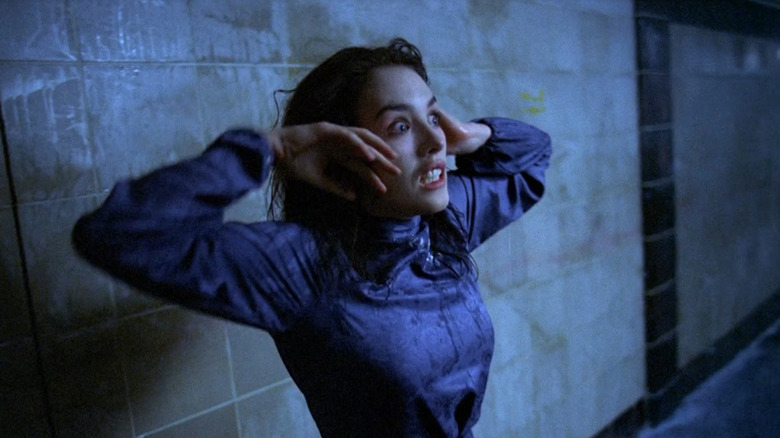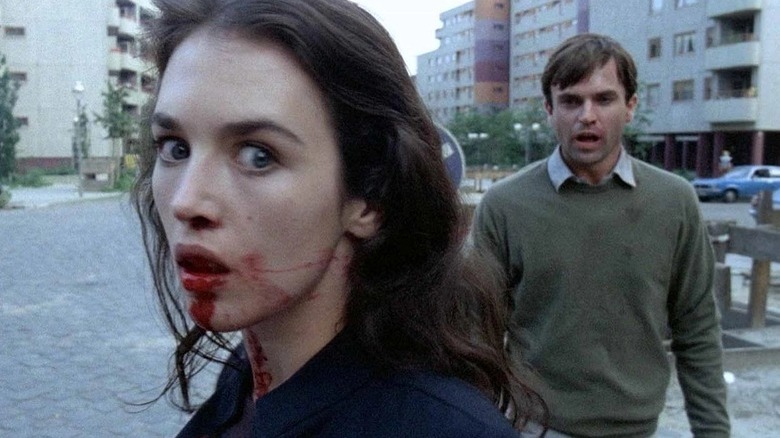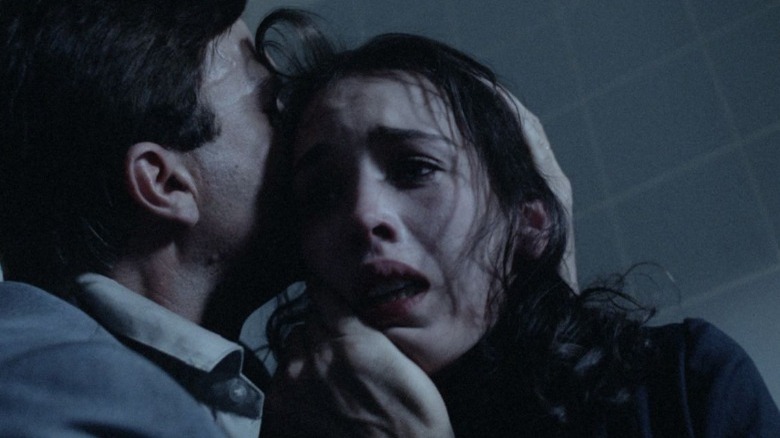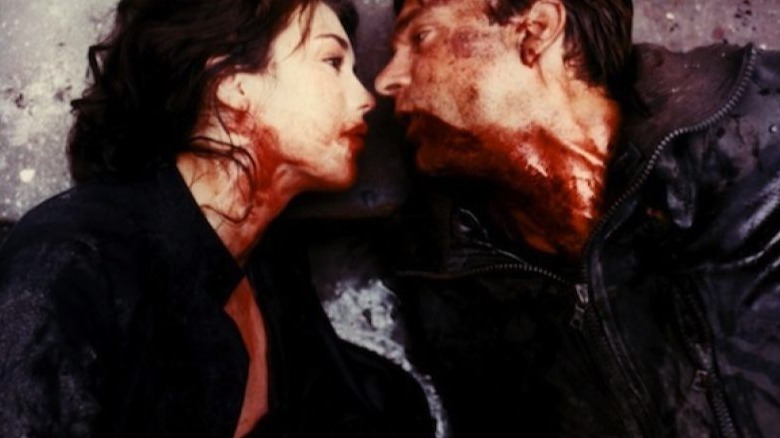Possession Ending Explained: We Are Makers Of Our Own Evil
When Polish filmmaker Andrzej Żuławski released his disruptive second feature "The Devil" in 1972, the film was promptly banned in Poland due to its treatment of taboo subjects and its layered political subtext. Determined to fight against government repression, Żuławski spent the following years making his epic science fiction film "On the Silver Globe," which remained unfinished due to further state intervention. Although the Polish government ordered all materials be destroyed, they were eventually preserved and the film premiered at the 1988 Cannes Film Festival. After Żuławski moved to France to be able to create art more freely, he made a string of renegade arthouse films that were deemed extreme and controversial, as they challenged notions of "normalcy."
Among them was 1981's "Possession," Żuławski's only English-language horror offering that contained autobiographical elements, starring Sam Neill and Isabelle Adjani. While "Possession" has garnered cult status as the years passed, it received lukewarm reviews at the time of its release and was quite overlooked in mainstream horror circles. Now, with the film's recent Shudder exclusive re-release, Żuławski's unsung masterpiece is finally getting the spotlight it deserves. A viscerally terrifying tale about divorce, "Possession" makes for an extremely unpleasant watching experience, where a lovelorn Sam Neill hounds a hysterical, electrifying Adjani in cramped apartment spaces and the streets of Berlin.
"The story of 'Possession' is the story of my life," Żuławski says in the DVD commentary for the film, making the story intensely, horribly personal to the point of repulsion. There is blood, copious amounts of pus, and a slow-burn subway sequence that is the stuff of nightmares. Together, they create an unforgettable, one-of-a-kind glimpse into what happens when two people in love fall apart, hooking their claws into each other until the world is brought to the brink of extinction.
Because you say 'I' for me
When married couple Mark (Neill) and Anna (Adjani) are introduced on-screen, one can immediately feel that something is amiss. Anna abruptly demands a divorce, leaving Mark alone in their apartment with their son Bob (Michael Hogben), who does not quite understand the secondhand trauma inflicted on him by his parents. Anna's discontinuous presence, along with the implication that she has found a new lover, drives Mark insane: he rocks in his armchair with manic intensity and desperately calls Anna's friends for any leads about her perceived affair, while shivering frantically at night like an addict experiencing withdrawal.
In the rare moments Anna chooses to return, she remains painfully obtuse, directing warmth only toward her son, while shunning Mark's attempts at reconciliation. As Mark's obsession escalates, so does Anna's erratic behavior — the love-hate dynamic between them is dangerous, palpable, often ending in physical violence and uncomfortably honest confessions. Żuławski portrays this maddening spiral with dramatic camera zoom-ins, unconventional angles, and a recorded ballet room video in which Anna bares her soul. "I can't exist by myself because I'm afraid of myself, because I'm the maker of my own evil," she says.
This utterance is the core of "Possession," as it is the key to unlocking Anna's psyche, wherein a major tussle between Sister Faith and Sister Chance is taking place. Possessed by the need to covet what she does not have, Anna needs to hurt Mark repeatedly, even when a part of her loves him deeply. This friction creates insurmountable guilt mired in repressed desires, which culminates in the subway scene, where Anna literally births her own evil. This Frankensteinian monster is otherworldly in its very existence — depraved and taboo — parasitically evolving into Anna's ideal vision of Mark by the end of the film.
I simply cannot let go
Throughout "Possession," we view Anna through Mark's eyes, always tinted in blue, her visage becoming more eldritch and terrifying with time. Vibrant, red blood splotches run down her mouth as she eyes the camera with the intensity of a woman possessed. As Anna's transformation serves a largely allegorical purpose, her perception is greatly tainted by Mark's bottomless obsession with her right after she demands a divorce. Unable to reconcile this version of Anna with the one in his heart, Mark is literally incapable of letting her go, which leads to him killing Anna's lover Heinrich and shielding her from harm later on. When he sees Anna having sex with the tentacled monster (a manifestation of her psychosis), he watches voyeuristically, both fascinated and repulsed. This warrants an enormous amount of self-loathing and degradation — contributing factors to his split with Anna.
However, this inability to let go momentarily comes to standstill when Mark meets Helen (also Adjani), a doppelgänger of Anna who seems subdued, unquestioning, and sweet. This double is Mark's perception of the ideal Anna: someone who has no consuming desires of her own, but instead, fulfills the dual wife-mother role diligently. This is why Helen dotes on Bob, and immediately assumes a surrogate mother role as she and Mark edge closer. This is also Mark's mechanism to move on, as he can only do so by clinging to a "perfect" version of the woman he now deems tainted, but also finds himself deliriously drawn to.
When Mark is with Helen, his worldview is calmer, permeated by a sense of idyllic domestic bliss. In stark contrast, when he is obsessing, Żuławski injects a hallucinogenic quality into Mark's immediate reality, imbuing these scenes with a harrowing edge. Whatever might happen when these disparate worlds collide?
When doppelgängers meet
In the dizzying climax of "Possession," Mark and Anna die together, leaving behind their idealized doubles to consummate their relationship. While Helen is inside the apartment with Bob, doppelgänger Mark rings the doorbell as the world around them mimics an apocalypse. Bob, exercising the intuition of a child (who is the true victim of this failed marriage) repeatedly warns Helen to not open the door. She obviously does, making sure that the cycle of failed unions continues, prompting Bob to drown himself in the bath. This is an especially agonizing scene where we witness the fate of a child would rather die than re-witness the same cycles of parental in-fighting /mutual abuse that leave generational wounds.
Experiencing "Possession" is akin to stumbling upon something violently intimate that is not supposed to be seen, as Żuławski exposes the rotting heart of a relationship on its last legs. The horror does not necessarily stem from the Lovecraftian monster, but the realization that the person who loves you today can choose to not do so tomorrow. Loving someone is a choice we make every day, but what happens when this choice ceases to make sense and becomes unbearable? In many ways, "Possession" is the ultimate breakup film, although it does not grant a silver lining in the end. Instead, it reminds you of the horrors of letting go and being let go of, and the physical/psychological exhaustion that comes with the inability to break the pattern.
With "Possession," Żuławski leaves behind the grotesque legacy of a failed relationship, where love neither heals nor urges us to be better. Instead, it forces us to confront the pit of self-destruction, where shame and obsession meet. In the end, we are makers of our own evil.



